To the great regret of the fans, there are very few strategies left in the modern video game market – publishers most often prefer more profitable genres, where they can stuff more decorative elements, DLC and battle passes. Precisely because of this, probably, Knights of Honor II: Sovereign has sunk into my soul so much – it looks fresh, plays nicely and brings a lot of positive emotions from each captured settlement and concluded a non-aggression pact. It’s time to choose a state to your liking, understand the mechanics and go to fight for valuable resources. Although, of course, it is not entirely necessary to fight – you can win in another way.
Urban development as it should be
Initially, it seemed to me that the city development system here is too complicated and incomprehensible – there are a lot of variables that need to be kept in mind. But when the brain begins to perceive information and understands how it all works, then you come to the exact opposite opinion – the developers have created a fantastically thought-out system for “pumping” settlements. There is no banal upgrade here, when you build, for example, a barracks of the first level, then save up gold and metal to upgrade the building to the second level, and so on. No, it’s much more interesting.
I will explain using the example of the “Food Market” (I just decided to follow the path of the merchant and, first of all, downloaded this direction). To build a market, you need to build “Agriculture” and “Windmill” in the agriculture branch, but then it turns out that barrels are needed for the market, and they are made in the “Woodworking” item. Accordingly, we need to build this upgrade for the city, and then open the necessary improvement there in order to fulfill all the conditions for installing the market. At the same time, each city has its own characteristics of resource extraction and even location, which should be taken into account when developing in one direction or another. For example, for irrigation you need a city standing on a river, and in order to trade in gems, you need to have deposits of these same stones.
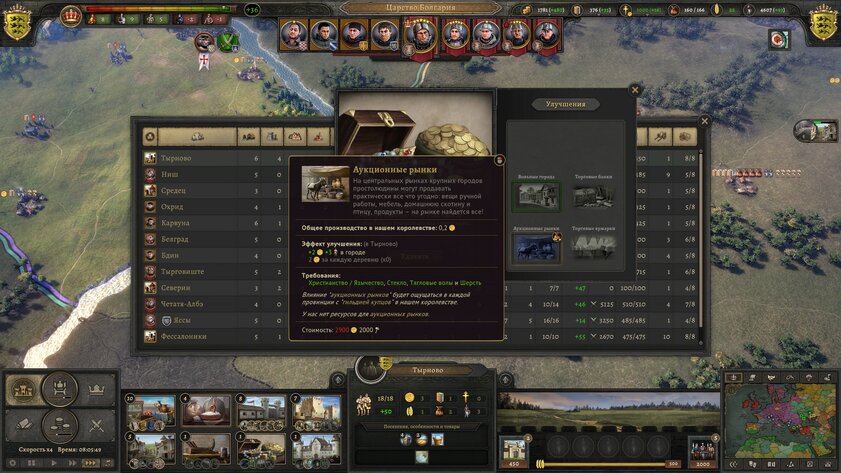
It turns out a rather complicated (at first glance) development system, since each building has a chain of upgrades, without which it is sometimes impossible to build an important building for further development. But gradually you begin to understand that you need metal processing to melt silver, cows are necessary for the development of agriculture, and horses can be used not only for the army, but also for trade. I liked this city development system just crazy – it is complex, interesting and realistic, logic can be traced in every point, and this, of course, cannot but bring pleasure.
Trade, Allies, Enemies, the Crusades, and the Pope
Gamers, in addition to developing their cities, need to pay attention to diplomacy and the royal family. I must say right away that this is even more difficult than with development, since there are even more variables. Various countries will send you offers to make an alliance, start trading, or, for example, they will call you to help in a crusade against a sworn enemy. And you probably haven’t even seen this sworn enemy on the map yet, since it is located on the other side of Europe, but if an ally is refused, then the clergy may be upset, and relations with the ally will fall below average.
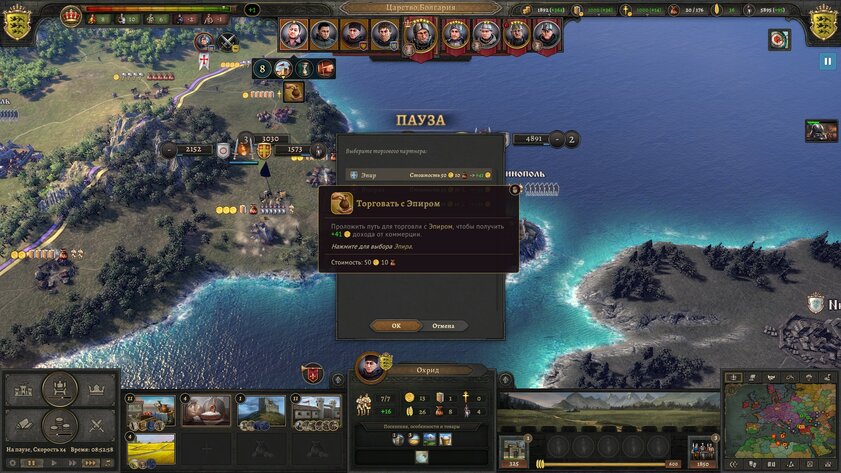
At the same time, some countries are ready to just trade and do not ask for more. Enter into trade alliances with them, send merchants and soon there will be a lot of gold (I entered into trade alliances with everyone I could reach, and gold flowed like a river). True, it should be borne in mind that sooner or later your ally will decide to fight with those who brought you gold, and then your country will lose a small percentage of the profits. It seems that this is not a problem, but soon you will notice that Europe during the Middle Ages fought constantly, without stopping and respite. So strong trade alliances can soon become a burden – you have to choose between 43 gold and good relations with Germany, for example.
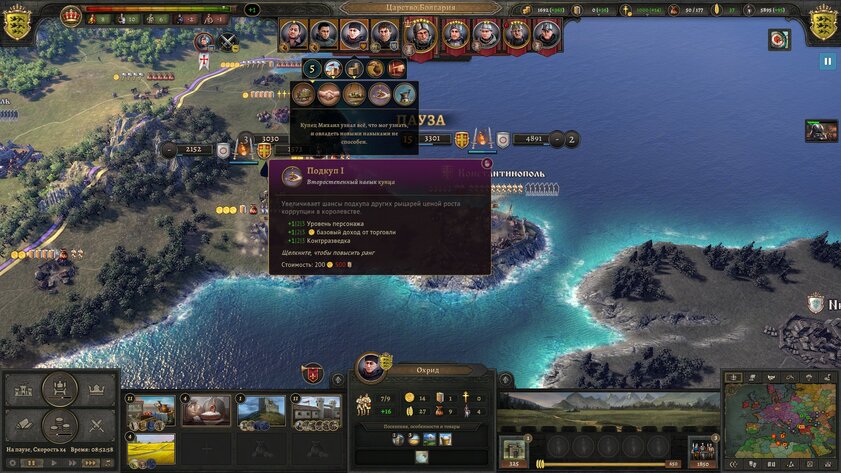
We also add the king and his family here – the head of state constantly has sons and not only them, they grow up (which is logical) and they can be “pumped”. Someone can expand the possibilities of trade, someone will have the skills to bribe, and someone will have to learn how to fight and manage the army. I advise either to go deep in one direction, but then you will have an army or negotiations, or develop each member of the royal family in one of the directions. Getting the balance right is great. It won’t work out – sooner or later another son will be born to the king anyway.
The war without which
Not to say that I am a pacifist, but in strategies of this kind, it has always been more pleasant for me to develop in the economic direction, and then fight if I have to. The problem is that they don’t give you much choice, because in Europe in those days every state or province had enemies who periodically forced them to buy an army for defense. And the fact is that you can defend for a very long time, but sometimes it is more effective to attack in response. They gathered a detachment, attacked the enemy, demolished a couple of settlements for him and plundered the villages, after which they sent a messenger and offered peace. Most often, the opponent will agree, but no one guarantees that he will not want his territories back soon.
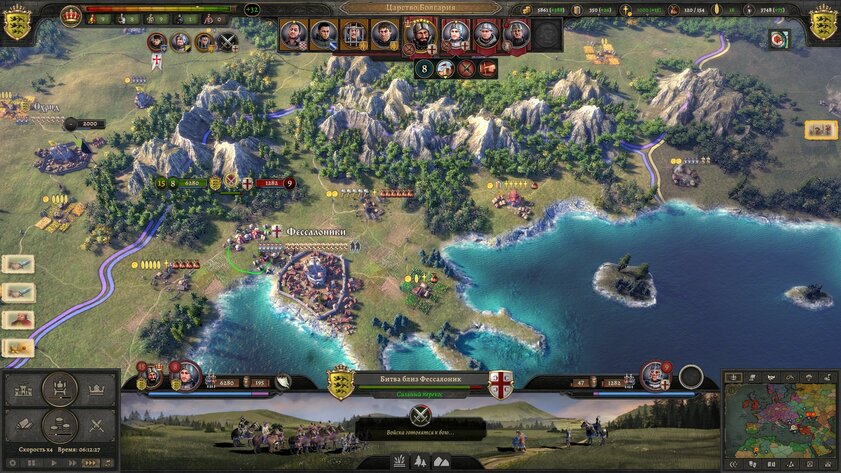
The battle process itself can be entrusted to AI (then the system compares your bonuses from upgrades and the number of armies with similar characteristics of the enemy) or play the strategist yourself. I want to admit that I tried to fight on my own just a couple of times and it didn’t go very well for me – somehow clumsy, and for a long time, to be honest. For each settlement, you will need to fight several times – first besiege the castle itself, then restore order there, and then at least two or three times uprisings will break out there that need to be suppressed. And if you constantly fight in manual mode, then you will get tired faster than destroy at least one enemy.
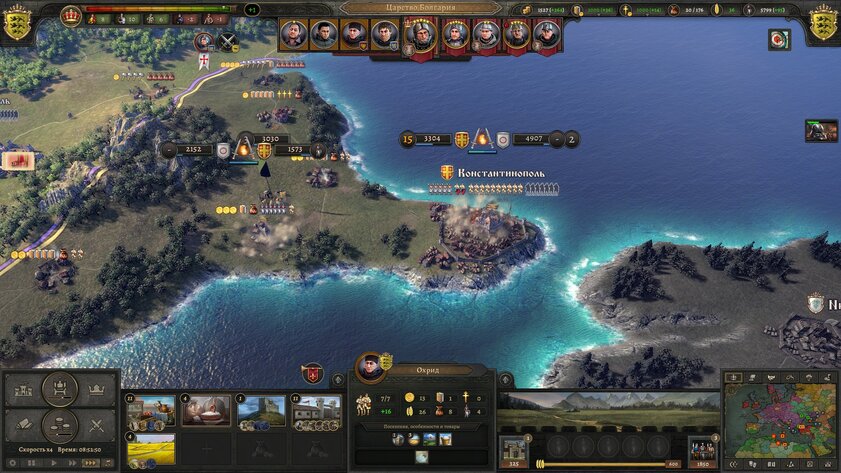
It is very important to keep in mind a couple of key points. The first is that more than two of your units cannot participate in one fight, so it will not work to collect ten armies and attack all at once. Secondly, marshal perks play a key role, since the strength of the army, the number of fighters, and much more depend on them. An experienced commander of level 15 with 2000 fighters easily wipes out level 5 with 2500 with minimal losses. And third, you only have eight general slots. At the same time, two or three will be occupied by merchants, otherwise there will be too little gold and you will die economically, you need at least one diplomat and it is desirable to have a bishop. Accordingly, in the best case, you will have three or four marshals who control the troops of warriors. This imposes certain restrictions on the offensive and defense – keep in mind.
Cater to all segments of the population
A very important element of the gameplay is the “Stability” parameter – it depends on it how often rebellions will arise in your country. This parameter is made up of many variables – from the opinion of each of the strata of society and some secondary factors. The player needs to constantly cajole the nobility, the army, the merchants, the clergy and the mob, maintaining a balance. For example, the mob can be appeased by entertainment establishments and increasing the level of their provision, the army likes it when you improve the army and win victories, and merchants and clergy need to constantly conclude new contracts.
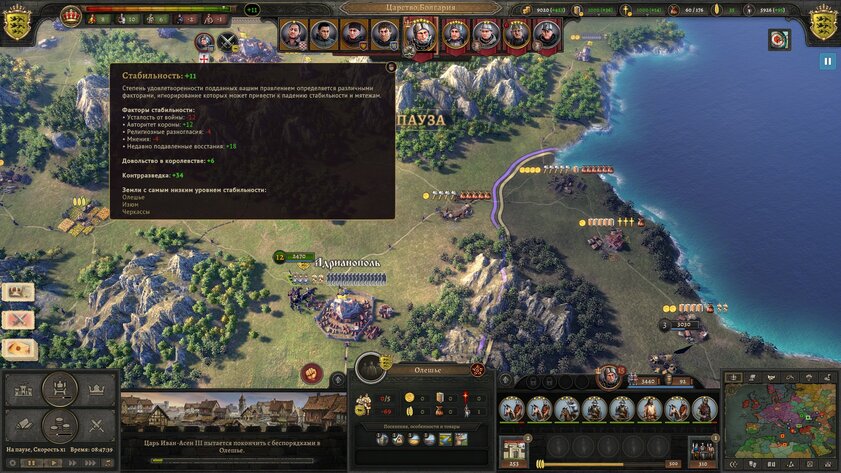
Also, the game will constantly throw you various additional activities. For example, Constantinople goes on a crusade and asks for help in gold – if you refuse, the clergy will be upset and stability will fall, and if you pay, you will have to wait for resources to upgrade. Similarly with trade, captured opponents and not only – the player all the time has to choose between layers of society in order to stay afloat. But there is, of course, a trick – if you just go to war against some small province and win, then everyone will immediately become so happy that you can forget about this problem for some time.
The subtleties on which everything is built
I think it’s already clear that I liked the game, but I would like to draw attention to a couple of subtle moments that literally struck me. Firstly, the developers paid special attention to religion, which plays a key role in the gameplay. If you, being a Catholic, take over a city where all the pagans, then the level of resistance will be just insane (until you demolish their church, for example). This significantly complicates the process of capturing territories and I have not seen this before in games. Secondly, artificial intelligence is able to assess the situation and not enter into unprofitable alliances.
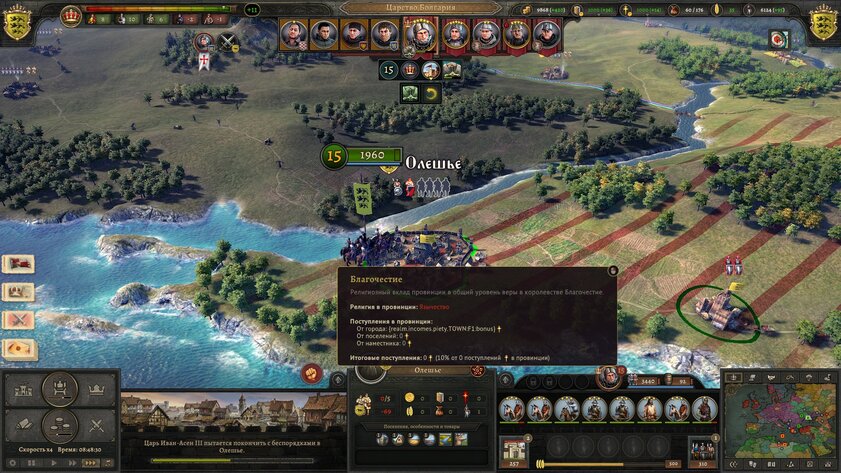
Let’s say you have only one detachment for about 2,700 soldiers, they declared war on you, and you sent a diplomat to negotiate peace. Nothing will come of it, since the AI understands that it has 4,400 warriors, which means it is stronger – why make peace if you are stronger? Moreover, if you break a couple of enemy units, then he will immediately offer peace, as he understands that there will be trouble. And thirdly, I really liked the mechanics of politics – you can make defensive alliances against someone if you understand that the enemy is strong and can attack. You can enter into marriages and thereby strengthen relationships, bargain, bring tribute and even land.
Review
To be honest, I’ve always been a fan of shooters and RPGs, and strategy games are a thing of the past when EA’s Generals was the pinnacle of excellence on the market. At the same time, I had a chance to play many projects in this genre and I can safely say that I got a lot of pleasure from Knights of Honor II: Sovereign. The project is quite complex, I agree, so at first the abundance of resources, characteristics, mechanics and upgrades can turn your head. But it’s enough to lose to the nines a couple of times to understand the basic things, and then it will be very easy to conquer Europe during the Middle Ages. And trust me, you’ll love it.

✅ Benefits
- a huge range of states;
- the location affects the resources mined in the provinces;
- extremely logical and realistic city development system;
- the ability to spy, conduct politics, fight and make alliances;
- nice graphics (if you don’t look at the details at the maximum zoom);
- you can fight as a general.
❌ Disadvantages
- a lot of variables;
- there is no voice acting in Russian (only the text is localized);
- restriction in slots for construction;
- often AI behaves stupidly and illogically;
- spying is very hard even on the lowest difficulty level.
Source: Trash Box
Charles Grill is a tech-savvy writer with over 3 years of experience in the field. He writes on a variety of technology-related topics and has a strong focus on the latest advancements in the industry. He is connected with several online news websites and is currently contributing to a technology-focused platform.







